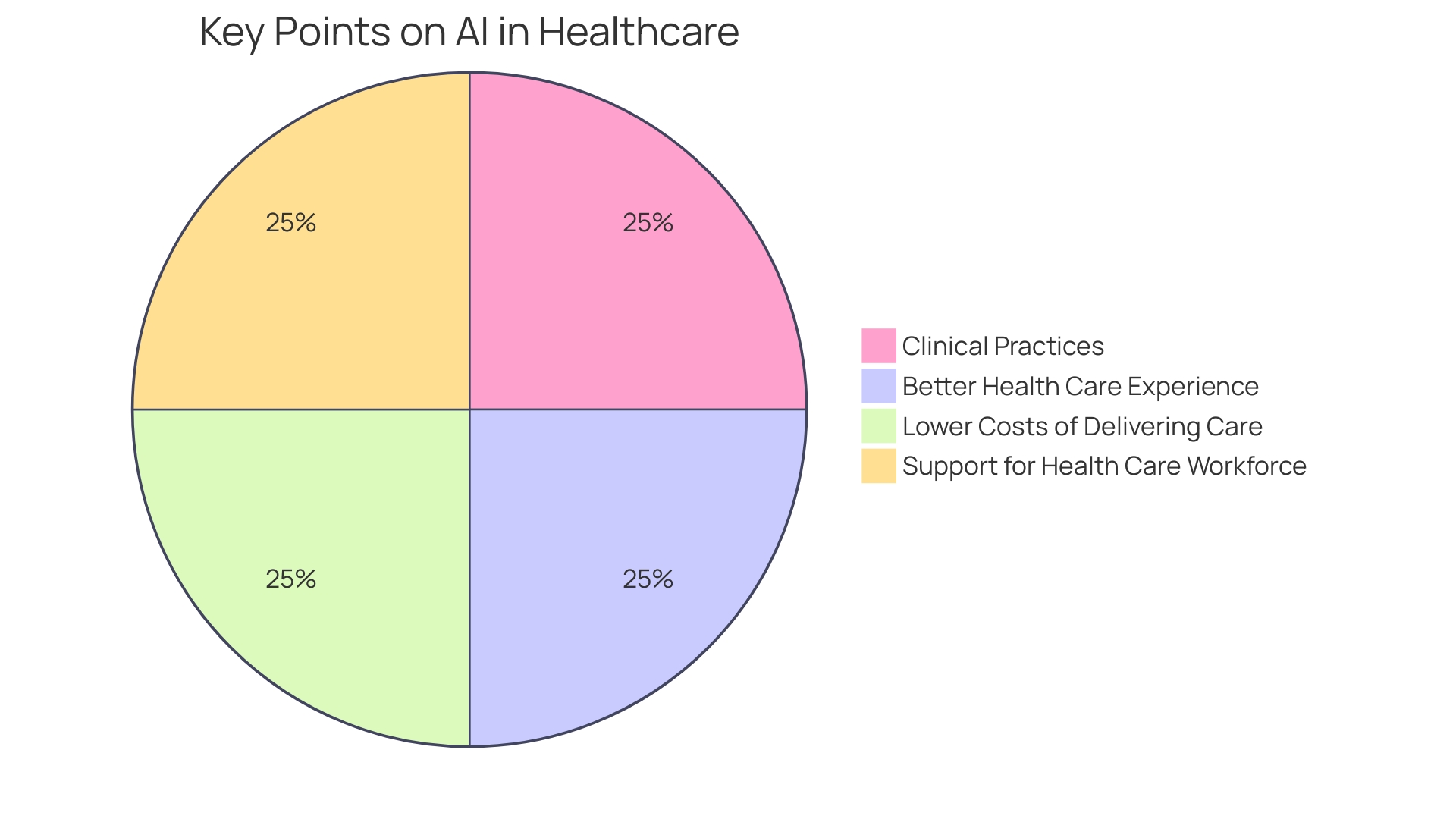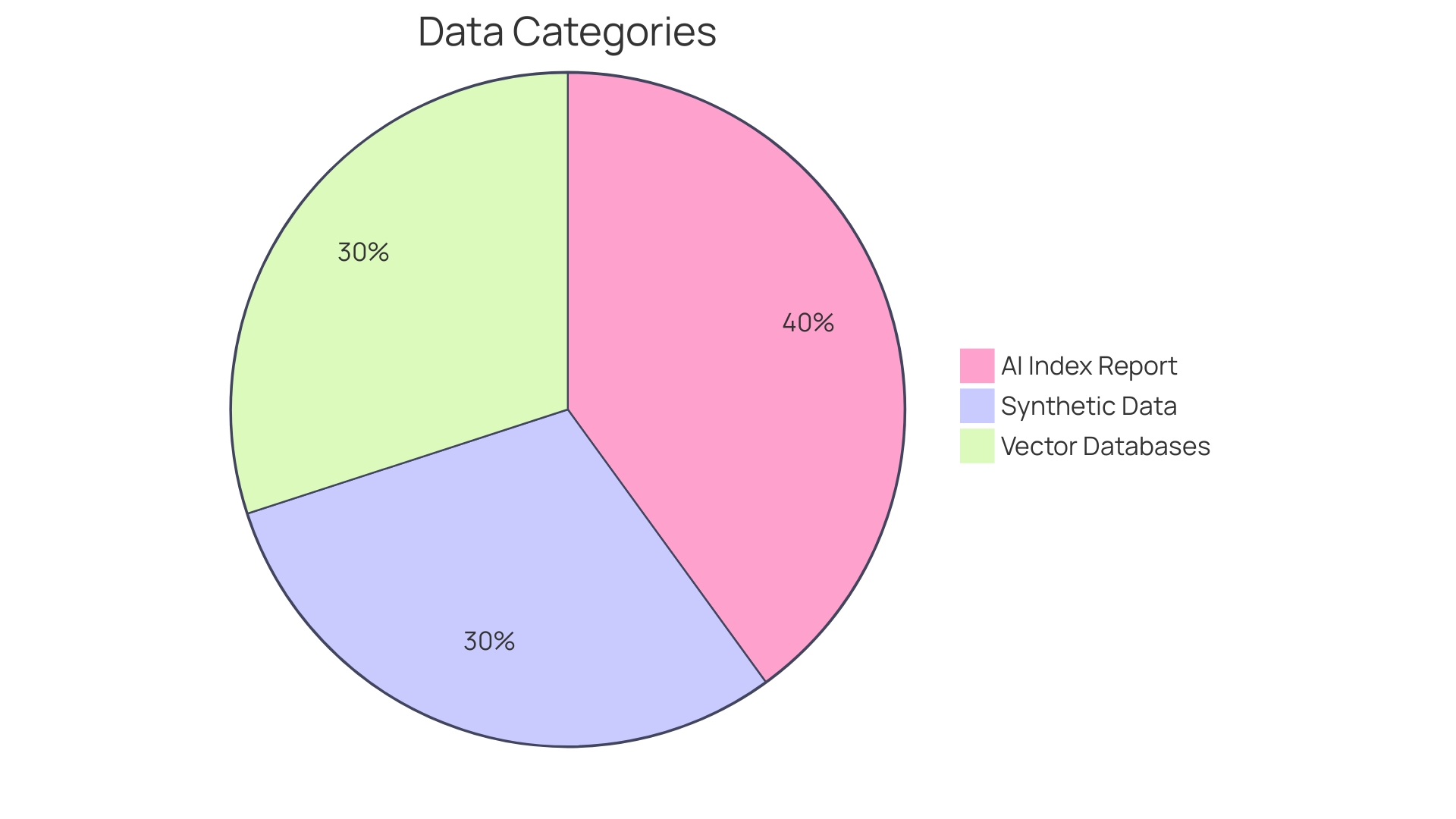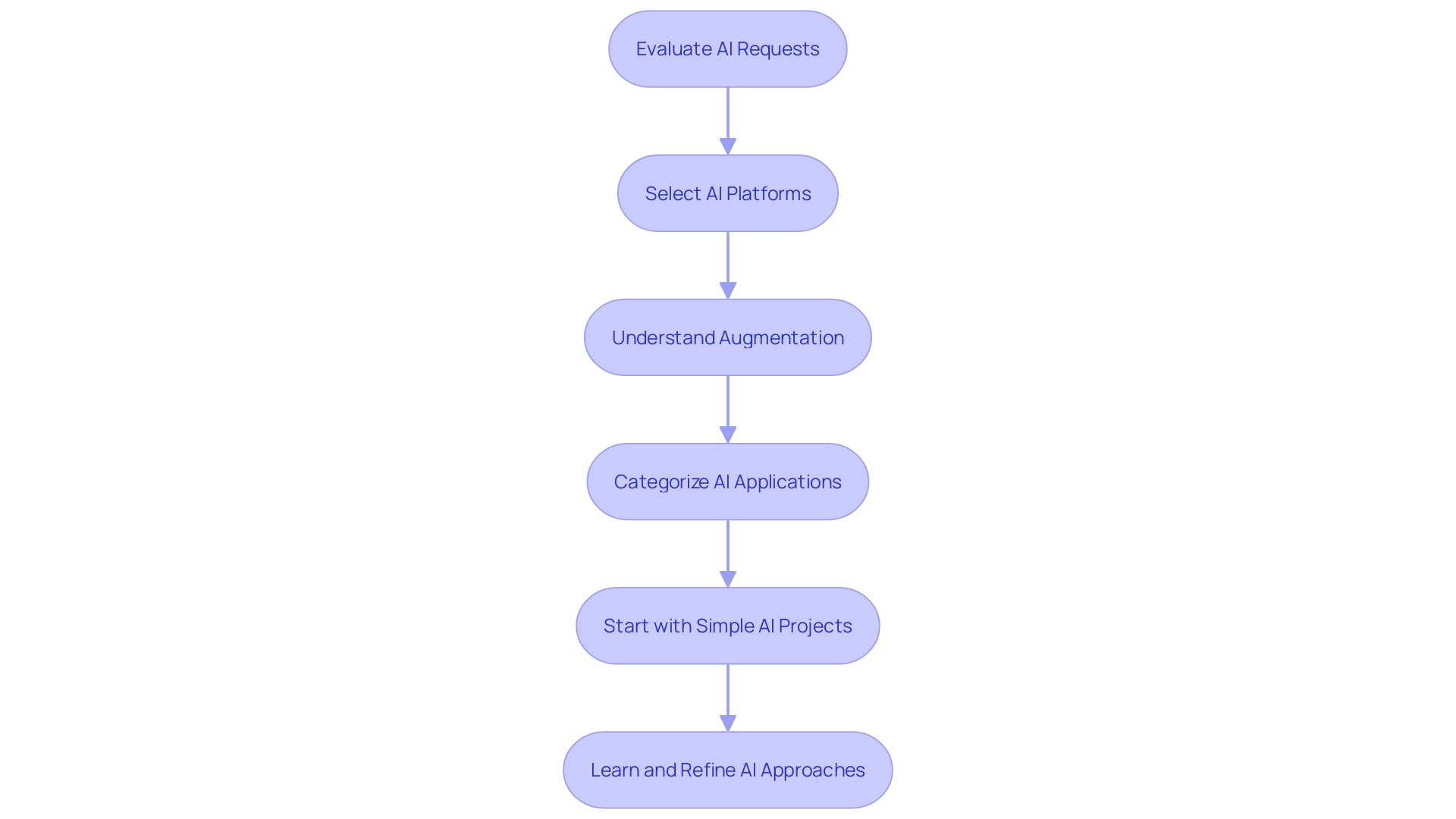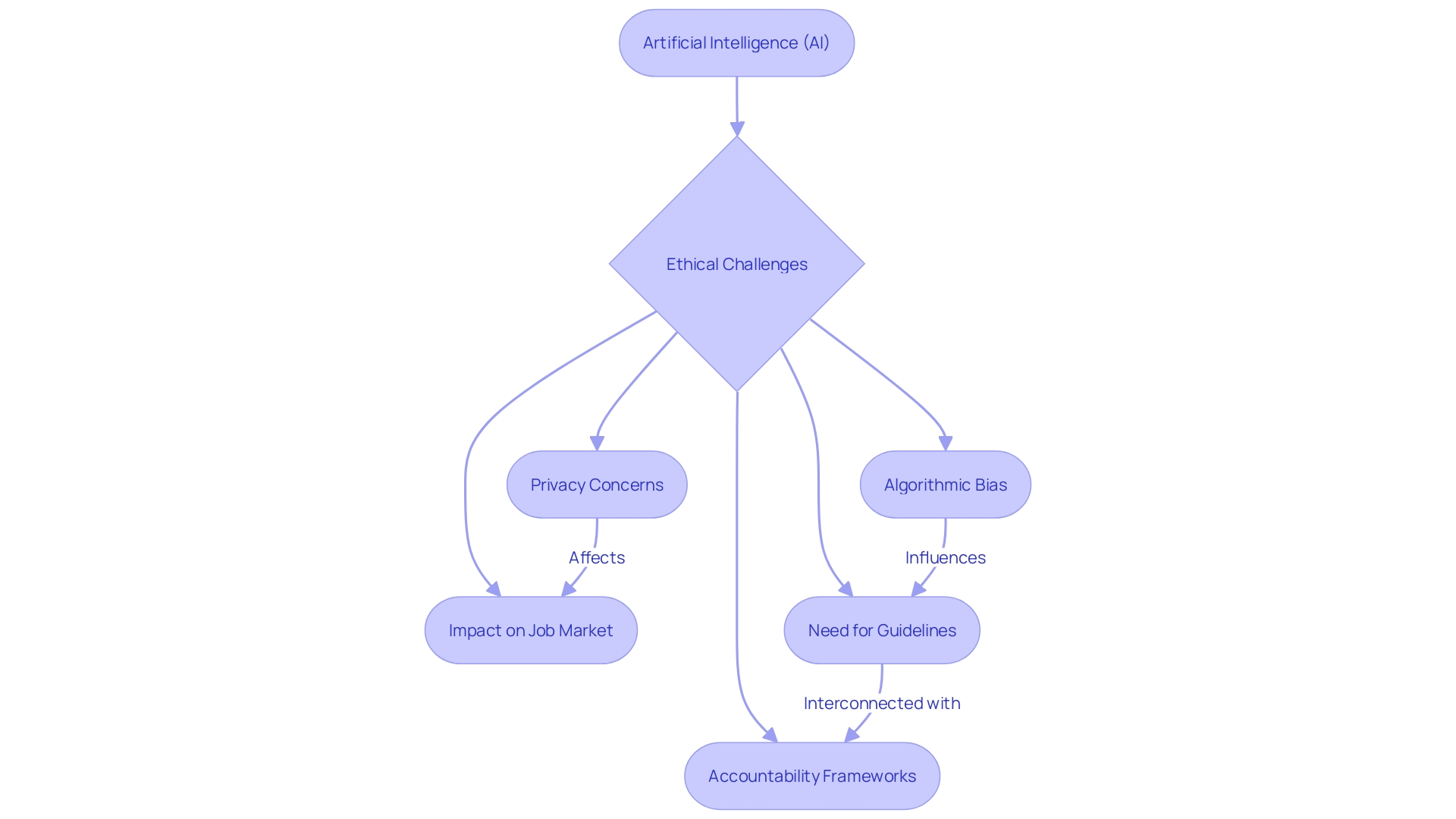Introduction
Artificial Intelligence (AI) has permeated various sectors, revolutionizing business operations and transforming customer experiences. From customer service to sales and marketing, supply chain management to financial services, healthcare to innovation management, AI is reshaping industries and driving operational efficiency. As organizations strive to implement AI technologies, it is crucial to navigate the ethical considerations and transparency challenges that arise.
Additionally, continuous learning and adaptation are essential to leverage AI effectively and stay competitive in the rapidly evolving technological landscape. This article explores the impact of AI in different sectors, highlights key lessons from AI implementation, and discusses the future of AI in business.
AI in Customer Service: Enhancing Customer Experience
As the realm of customer service continues to evolve, AI chatbots have emerged as a linchpin for ensuring customer contentment and fostering brand allegiance. A notable example of this innovation is KLM's AI-powered chatbots, which have significantly slashed response times and bolstered customer satisfaction by adeptly managing diverse customer inquiries.
According to statistics, a staggering 70% of customer queries can now be automated through AI, with over 63% of retail companies harnessing AI to augment their customer service efforts. Notably, more than half of these companies have integrated generative AI into their customer service strategies, reflecting a burgeoning trend that shows no signs of abating. Generative AI, in particular, is being celebrated for its ability to enhance engagement by offering personalized and immediate responses, a critical factor given that 78% of customers have renounced a purchase following a single negative service encounter.
The implementation of AI in customer care is also reshaping how support teams operate. For instance, Holiday Extras, a principal travel extras provider in Europe, has leveraged AI to address the multilingual needs of its international clientele. This automation extends to other facets like marketing and data analysis, enabling a seamless service experience that transcends linguistic and cultural barriers.
Moreover, AI chatbots are proving their mettle by delivering consistent, round-the-clock support, as evidenced by recent data indicating that 88% of users engaged with a chatbot in 2022. This continual availability stands in stark contrast to traditional customer service models, which were often limited by the business's operational hours and channel capacity.
The transformative impact of AI on customer interactions has been profound. Where once customers were confined to 800 numbers and static communications, they can now seek assistance via chatbots or social media, obtaining real-time resolutions that align with their preferences. This paradigm shift underscores the importance of embracing AI technologies that prioritize customer convenience and personalization.
In light of these advancements, companies are encouraged to consider data privacy and compliance, particularly with generative AI technologies. As compliance and branding remain pivotal, the ability of AI to generate brand-specific, compliant responses is proving invaluable.
The successful deployment of AI chatbots, as showcased by Klarna's OpenAI-powered assistant, exemplifies the efficiency gains possible through this technology. Klarna reports that the bot, equating the work of 700 human agents, has managed 2.3 million conversations, constituting two-thirds of customer service interactions, while slashing repeat inquiries by 25% and reducing resolution times from eleven minutes to under two.
This surge in AI adoption for customer service is not merely a trend but a strategic imperative, with consumers increasingly expecting quick, competent, and personalized support. As we look to the future, it is clear that AI chatbots will continue to play a critical role in shaping the customer service landscape, driving both customer satisfaction and operational efficiency.
AI in Sales and Marketing: Targeted Strategies and Campaigns
The fusion of Artificial Intelligence (AI) with sales and marketing strategies has ushered in a transformative era for business-customer interactions. Companies like Coca-Cola are at the forefront of this innovation, leveraging AI marketing platforms that delve into the intricacies of customer behaviors, preferences, and evolving trends. By harnessing the power of advanced data analytics and machine learning, these platforms facilitate the crafting of marketing campaigns that are not only highly targeted but also deeply resonant with the intended audience.
The result is a tangible uplift in conversion rates and a marked improvement in return on investment (ROI).
Fuelled by AI's capabilities, the marketing domain has witnessed a substantial uptick in its maturity, albeit with the bar continuously being raised. This is echoed by the compelling evidence of a brisk evolution in data-driven marketing, underscored by Traffic Builders' experience, a component of the Unbound Group. Their journey of over two decades in digital marketing and analytics, and recognition as a leading agency, exemplifies the strides made in the B2C and B2B sectors.
Amidst this landscape, AI's prevalence within the marketing apparatus of companies is undeniable. An overwhelming 95.8% of marketers now deploy AI tools in their daily operations, with its application extending across various company departments. Nonetheless, the journey of AI integration is not devoid of challenges.
Organizations face strategic decisions whether to cultivate in-house data science expertise or to seek external vendors for AI tool training and maintenance.
The narrative of AI's influence is further reinforced by statements from industry leaders like Pipedrive CEO Dominic Allon, who underscores the current epoch as one marked by groundbreaking AI advancements that bolster business growth with unprecedented precision and effectiveness. Yet, the enduring significance of human relationships and fundamental sales skills in an AI-dominated environment continues to be emphasized.
Artificial intelligence's role in enriching customer engagement and personalization is profound. It emulates human intelligence through algorithmic prowess and pattern recognition, employing machine learning and deep learning to discern trends, forecast outcomes, and execute digital functions. As AI absorbs more data, its proficiency in anticipating customer preferences enhances, promising a more tailored and intuitive user experience.
AI in Supply Chain Management: Optimizing Efficiency
Harnessing the power of Artificial Intelligence (AI) is becoming a cornerstone for businesses seeking to enhance supply chain management and secure a competitive advantage. Pioneering this transformation, UPS has integrated AI into its logistics platform, leveraging real-time data analysis and predictive modeling to refine delivery routes, diminish operational costs, and guarantee the punctual distribution of products.
The emergence of AI in supply chain operations signifies a shift from traditional methods to more dynamic, data-driven approaches. AI applications are poised to augment short-term demand sensing, a vital component for maintaining optimal inventory levels and mitigating costs associated with overstocking or stock shortages. By accurately forecasting demand, AI enables the production of precise quantities of products, optimally located to meet consumer needs while reducing unnecessary safety stock.
This evolution is underpinned by the recognition that AI is more than just rapid processing of large data sets; it embodies the capability to learn and adapt, rewriting its algorithms based on historical and real-time inputs. The trajectory of AI development suggests a future where autonomous vehicles, such as trucks, become increasingly prevalent, driven by advancements in technology and a complex array of contributing factors.
Industry leaders emphasize AI's transformative role in decision-making and strategy formulation within intricate supply chains. For instance, AI simulation software offers unprecedented foresight, enabling companies to predict and prepare for a multitude of potential futures, thereby enhancing resilience and sustainability. Such technology has been adopted across various sectors, providing decision-makers with tools to simulate and navigate through the complexities of global supply chains.
In summary, AI is not only reshaping how organizations manage their supply chains but also redefining the landscape of logistics and warehousing. The strategic application of AI/ML technology is crucial for companies to stay ahead in a market where efficiency, agility, and foresight are key drivers for success.
AI in Financial Services: Enhancing Fraud Detection and Risk Management
In an era where financial fraud presents a dynamic and sophisticated challenge, traditional detection methods are faltering under the pressure of intricate schemes and voluminous data. Fraudsters are leveraging their deep understanding of internal controls to devise schemes that blend seamlessly with legitimate financial processes, rendering them nearly invisible to rudimentary scrutiny. This complexity is compounded by the staggering amount of financial data produced by modern businesses, including multifaceted transactions and convoluted accounting treatments that obscure anomalies.
Bolton & Hand's (2002) seminal work on statistical fraud detection highlights the efficacy of statistics and machine learning in unearthing fraudulent activities such as money laundering and e-commerce credit card fraud. However, with fraudsters continuously refining their tactics, there is an urgent need for more robust and adaptable solutions. Generative AI (GenAI) has emerged as a formidable force against financial fraud, distinguished by its ability to learn from data patterns and evolve in response to new fraudulent strategies.
Financial institutions are now turning to GenAI and similar AI-driven technologies to bolster their defenses. For example, by harnessing the power of AI, JPMorgan Chase's virtual assistant has elevated the bank's capacity to detect and manage risk, scanning vast datasets in real time to pinpoint suspicious activities. This proactive approach is critical, as according to a recent survey, over two-thirds of organizations have experienced a rise in consumer account fraud attempts over the past year, with significant financial implications.
Indeed, payment fraud alone is anticipated to cost businesses around $206 billion in the next four years, necessitating an annual investment of $11.8 billion for prevention by 2025. As the financial sector grapples with this reality, AI and ML stand as pivotal innovations, ensuring customer trust and the integrity of the banking industry through advanced and scalable fraud detection capabilities. Thus, Ai's integration within financial services signifies a transformative shift towards more secure and resilient financial ecosystems.
AI in Healthcare: Personalized Treatment and Diagnosis
The integration of Artificial Intelligence (AI) into healthcare has led to substantial advancements in patient care, offering a more personalized approach to treatment and accurate diagnostics. By harnessing the power of AI, systems like IBM Watson Health's AI platform for cancer diagnosis provide a remarkable level of support to healthcare professionals, enabling more informed decisions based on comprehensive data analysis. This includes a deep dive into patient medical records, clinical research, and individualized patient data, culminating in actionable insights and tailored recommendations that enhance patient outcomes and refine treatment protocols.
In rural India, the Intelehealth telemedicine platform showcases how AI can bridge the gap in healthcare delivery by connecting patients with healthcare providers remotely, addressing the stark shortage of medical professionals. This innovative approach is instrumental as, by 2030, a projected shortfall of 10 million healthcare workers globally threatens to exacerbate access issues, particularly in areas where there are less than two doctors for every 10,000 residents. Intelehealth's AI capabilities are pivotal in mitigating the extensive travel, costs, and workday losses faced by rural patients seeking quality medical care.
The transformative power of AI extends to the management of vast and diverse datasets, including electronic medical records, imaging, and laboratory tests. Natural Language Processing (NLP) excels in synthesizing unstructured data into coherent summaries, enabling physicians to build comprehensive medical histories and identify the most effective treatments for individual patients. Simultaneously, computer vision facilitates early disease detection by analyzing medical imagery, proving especially valuable for conditions like diabetic retinopathy and skin cancers.
Advancements in AI-driven healthcare are rapid, with applications ranging from decision support systems and early multi-cancer diagnostics to the creation of personalized medical products and digital twins. These technologies, such as adaptive radiotherapy, allow for real-time treatment adjustments, offering a level of personalized care previously unattainable. However, navigating the regulatory landscapes for these novel AI applications presents a considerable challenge, given their intersection with various legal frameworks and the nascent nature of the current legislation.
The recent study published in Cell Reports Medicine on lung cancer pathology underscores the pivotal role of AI in revolutionizing pathology, enabling pathologists to forgo traditional microscopes in favor of digital platforms that identify specific genetic markers for personalized therapy.
The potential of AI in healthcare is acknowledged widely, with experts emphasizing its role in transforming care delivery, improving outcomes, and addressing the critical challenges of aging populations, precision treatment options, and medical professional burnout. However, the successful integration of AI hinges on overcoming hurdles such as data standardization, accessibility, and ethical use, ensuring a balanced approach between the revolutionary and human-centered aspects of AI in healthcare. As we delve into the future of AI in healthcare, the focus on enhancing clinical efficiency through AI-powered software is evident, with the healthcare market increasingly adopting AI to bridge the patient-care provider divide and optimize patient care with remarkable precision.

AI in Innovation Management: Streamlining Product Development
Artificial Intelligence (AI) has become an indispensable asset in the realm of product innovation, providing businesses with unprecedented capabilities to analyze a multitude of data points. Organizations can harness AI to dissect market trends, sift through customer feedback, and scrutinize their existing product offerings, all in an effort to unearth new opportunities and refine their approach to innovation. The incorporation of AI into product development not only expedites the introduction of groundbreaking products but also ensures companies remain competitive.
As the field of AI continues to advance, the impact on software engineering has been profound, with developers experiencing a 25% average boost in productivity when utilizing Generative AI tools, according to a study by Turing. This surge in efficiency not only accelerates the delivery of software projects but also revolutionizes the product innovation cycle as a whole.
Moreover, the integration of AI is reshaping the landscape of manufacturing, where a staggering 93% of companies have initiated new AI projects in the past year. These manufacturers are bullish on Ai's potential to enhance productivity, throughput, and quality, thereby contributing to significant top-line growth. This trend is emblematic of the third wave of product design, where Ai's analytical prowess is leveraged to gain a deeper understanding of customer preferences and to drive the creation of generative designs.
The application of AI in patent litigation exemplifies its complexity-managing capability, as seen in the case of the '648 patent. By fusing an extensive patent knowledge base with AI, it becomes possible to meticulously locate and programmatically analyze documents critical to patentability and infringement, even in cases of considerable complexity. This demonstrates Ai's capacity to handle intricate analytical tasks that were traditionally the domain of highly specialized professionals.
In essence, AI has emerged as a vital tool that not only improves the efficiency and productivity of individual developers but also fundamentally changes the trajectory of product development and manufacturing. Its role in accelerating innovation and its long-term impact on these sectors underscore its importance in maintaining a competitive edge in today's rapidly evolving technological landscape.

Key Lessons from AI Implementation in Management
As organizations strive to implement AI technologies, it's crucial to glean insights from those who have already embarked on this journey. The integration of AI into business operations is not a one-size-fits-all endeavor, as demonstrated by the experience of the NHS. Their Digital Service Team meticulously evaluates requests for new digital technology, ensuring that they are secure, appropriate, and compliant with existing standards.
A similar due diligence process was undertaken by Medien Hub Bremen-Nordwest, where the selection of an AI platform resulted in immediate and significant improvements in customer complaint resolution times.
To fully harness the power of AI, companies must understand the concept of augmentation, which fundamentally enhances human capabilities. The AI act introduced by the EU in 2023, with its risk-based approach, underscores the importance of categorizing AI applications by the sensitivity of data and user access levels. This is exemplified by the Norges Bank Investment Fund, which recommended that its invested companies integrate responsible AI practices, not necessarily by having AI specialists on the board but by ensuring a collective understanding of AI's relevance to their business.
In practice, companies have found success by starting with straightforward AI projects that address specific issues. Mapping out processes, identifying stakeholders and systems involved, and selecting high-volume, low-complexity tasks can lead to early wins. These initial steps create a foundation for more complex AI initiatives.
According to Ipsos research, a clear roadmap and prioritization are critical in achieving timely value from AI investments. As the technology landscape continues to evolve, organizations must remain agile and adaptable, continuously learning and refining their approaches to AI implementation.

Preparing for the Future of AI in Business
The fusion of Artificial Intelligence (AI) and Cloud Computing is revolutionizing industries by driving innovation and operational efficiency. Businesses embracing AI are redefining their strategic imperatives, with a focus on cultivating AI talent and advancing a culture of innovation. Ethical considerations and transparency remain at the forefront of this transformation.
Firms like Holiday Extras have integrated AI into their operations, enhancing language translation for marketing and fostering a data-driven culture, thus addressing scalability and data fluency challenges. Similarly, the fashion giant Zara has implemented AI across its supply chain and customer engagement, optimizing inventory levels with real-time analytics. According to a joint study by Microsoft and Ipsos, the key to successful AI adoption lies in the roadmap that prioritizes evidence-based best practices and focuses on factors predictive of success.
This approach is echoed by industry leaders who view AI as a force multiplier for business evolution. The Canadian Survey on Business Conditions indicates a growing trend of AI usage in goods production among businesses, underlining Ai's influence across various sectors. With AI trends continuing to shape the future, organizations are advised to strategically align AI initiatives with their business objectives to stay competitive in the evolving digital landscape.
Ethical Considerations and Transparency in AI Adoption
Artificial Intelligence (AI) is transforming the landscape of technology and cybersecurity, but it doesn't come without its ethical challenges. The pressing ethical considerations cannot be ignored, particularly as Ai's capabilities continue to advance at a breathtaking pace. Privacy remains a top concern as AI systems can process vast amounts of personal data, potentially leading to breaches of confidentiality.
Moreover, the fairness of algorithms is under scrutiny; algorithmic bias can lead to discrimination and social injustice if not properly addressed. Such biases can inadvertently arise from the data sets used to train AI, which may reflect existing human prejudices.
Additionally, the impact of AI on the job market is a matter of great debate. While AI can increase efficiency and reduce the need for human intervention in routine tasks, it also poses a risk to employment in certain sectors. For instance, customer service roles are increasingly automated, with AI providing automated responses to common queries.
This trend underscores the importance of developing strategies to manage the transition and ensure that workers are not left behind.
To navigate these ethical waters, clear guidelines, regulations, and accountability frameworks are paramount. It's crucial to establish responsible AI practices that align with societal values and respect individual autonomy. Real-world applications, such as the project led by social tech entrepreneur Shiran Mlamdovsky Somech, demonstrate the potential of AI to address societal issues when used with careful consideration of ethical implications.
The initiative used AI to animate photographs of domestic violence victims, harnessing technology to raise awareness and evoke empathy.
Tech giants like Microsoft have grappled with these issues, as seen in the decision-making process behind their Seeing AI project, which prioritized privacy over the addition of a feature desired by users with visual impairments. Similarly, Amazon's facial recognition technology has faced criticism for its potential misuse and inaccuracies, driving home the need for tech companies to ensure their AI systems do not infringe on human rights or contribute to discrimination. As AI systems become increasingly embedded in our daily lives, it is of utmost importance that they are developed and deployed in a manner that is transparent, fair, and just.

Continuous Learning and Adaptation in AI Usage
Artificial Intelligence (AI) is transforming industries by offering unprecedented advancements akin to the impact of electricity on society. This transformation necessitates a culture of 'lifelong learning' within organizations, a term which in the context of AI, refers to devices and systems continuously learning and interacting with their environment in real-time. This concept is critical for the development of technologies such as autonomous vehicles and smart robotics.
To remain competitive and innovative, organizations must prioritize continuous learning and upskilling of employees to leverage AI effectively.
One exemplary case is that of Holiday Extras, a European travel extras provider handling a diverse international user base. The company faces challenges such as language diversity in marketing and data fluency among employees. By adopting a continuous learning approach, employees, particularly those in non-technical roles, are upskilled to become more data-literate, allowing them to engage with the organization's data-driven culture more effectively.
Another illustration of AI's transformative potential is seen in the healthcare sector with Summer Health. Here, AI has been employed to enhance the quality and efficiency of medical visit notes, reducing the administrative burden on pediatricians and improving the clarity of communication with parents. This not only saves time for healthcare providers but also provides more comprehensible information for parents, showcasing the direct benefits of AI in improving service delivery and operational efficiency.
Furthermore, the rapid growth of AI research, with publications doubling approximately every 23 months, underscores the need for continuous learning. As reported in 'Nature Machine Intelligence,' new tools like Science4Cast have been developed to help researchers stay abreast of the latest developments in AI, highlighting the necessity for organizations and individuals to keep up with the accelerating pace of innovation in this field.
In line with these examples, organizations across various industries, from healthcare to travel, are leveraging AI to improve operational efficiency and service delivery. In Canada, for instance, 6.1% of all businesses have utilized AI in producing goods and services, as reported by Statistics Canada in the Canadian Survey on Business Conditions. This reflects a growing trend towards AI adoption, emphasizing the importance for businesses to continually adapt and learn to harness the full potential of AI.
The integration of AI in business operations creates opportunities for innovation and efficiency. As AI continues to reach into every industry, it is vital for organizations to foster a culture of continuous learning and collaboration between humans and intelligent machines, enabling them to stay at the forefront of AI innovation.
Conclusion
AI has revolutionized various sectors, transforming business operations and enhancing customer experiences. In customer service, AI chatbots have improved response times and satisfaction. AI has reshaped support teams, addressing multilingual needs and providing round-the-clock assistance.
In sales and marketing, AI enables targeted campaigns, improving conversion rates. In supply chain management, AI optimizes efficiency by refining delivery routes and forecasting demand accurately. In financial services, AI enhances fraud detection and risk management, ensuring trust and integrity.
In healthcare, AI personalizes treatment and diagnosis, improving patient outcomes. In innovation management, AI streamlines product development, expediting innovation and maintaining competitiveness.
Key lessons from AI implementation include understanding augmentation, prioritizing evidence-based practices, and starting with straightforward projects. Organizations must remain adaptable, continuously learning, and refining their approaches to AI implementation.
The fusion of AI and cloud computing drives innovation and efficiency. Businesses cultivate AI talent and foster an innovative culture. Ethical considerations and transparency are crucial, with clear guidelines and accountability frameworks.
Continuous learning and adaptation are key to leveraging AI effectively and staying competitive.
In conclusion, AI has reshaped industries, driving operational efficiency and transforming customer experiences. Organizations must navigate ethical considerations, prioritize continuous learning, and adapt to the evolving technological landscape. By embracing AI effectively, businesses can stay competitive and harness its full potential.




